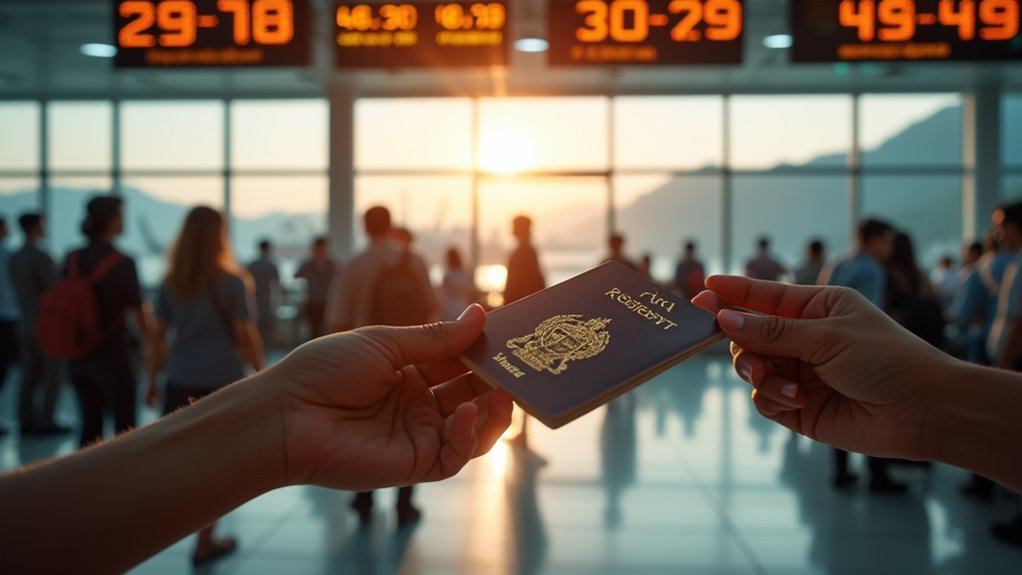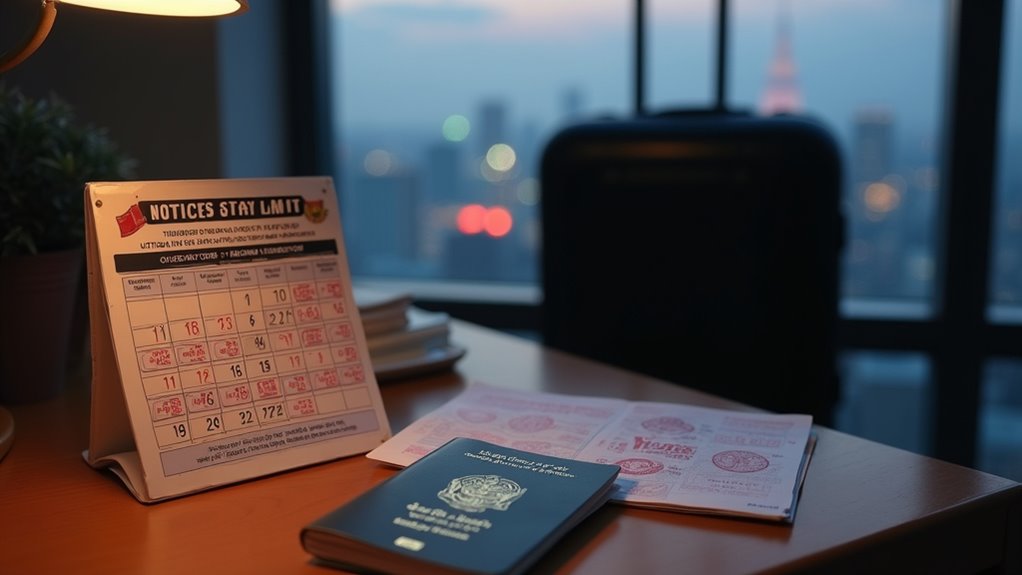Physical Address
304 North Cardinal St.
Dorchester Center, MA 02124
Physical Address
304 North Cardinal St.
Dorchester Center, MA 02124

Keep your Thai vacation legal with this essential guide to tourist visa options, from visa-free stays to long-term alternatives.
You can stay in Thailand for 30 days visa-free (recently reduced from 60 days), with a possible 30-day extension for 1,900 THB at immigration offices. For longer stays, consider a Tourist Visa (60 days), the Destination Thailand Visa (180 days per entry over 5 years), or the Thailand Privilege Visa for premium benefits. Check your nationality’s specific exemptions and plan ahead to avoid overstay penalties that can include fines or entry bans.

While Thailand has historically welcomed international visitors, the country’s visa-free program has undergone significant expansion in recent years. As of March 2025, you can enter Thailand without a visa if you’re from one of 93 eligible countries, up from just 57 countries before July 2024.
Currently, you’re allowed to stay for up to 60 days under the visa exemption program—double the previous 30-day limit. If you need more time, you may qualify for a 30-day extension through immigration offices under specific conditions. Travelers should be aware that the visa extension process requires submitting appropriate documentation at a local immigration office before your current stay expires.
However, this generous policy may soon change, as the government plans to reduce the visa-free period back to 30 days to address concerns about illegal activities and unauthorized work. For travelers requiring longer stays, applying for a Thailand Tourist Visa through a Thai embassy will remain an option. Most travelers only stay two to three weeks anyway, not utilizing the full period.
Since Thailand launched its digital visa system, travelers from all nationalities can now apply online through the official platform at www.thaievisa.go.th. The standard tourist e-visa offers a 60-day stay per entry within a 90-day validity window from the issuance date.
Thailand’s new digital visa system allows worldwide travelers to apply online, offering 60-day stays within a 90-day validity period.
For a successful application:
While enjoying Thailand’s welcoming culture, always prioritize personal safety by remaining aware of your surroundings, especially in crowded tourist areas.
Indian citizens with ordinary passports enjoy a 60-day visa exemption for tourism and short-term business activities until further notice.
Remember to print your approval for immigration verification upon arrival.

For travelers seeking to stay in Thailand beyond the standard 60-day tourist e-visa period, several long-term visa options exist to accommodate extended visits.
The upcoming Destination Thailand Visa (DTV) offers the most generous terms, with a 5-year multi-entry option allowing stays up to 180 days per entry—ideal for digital nomads and remote workers.
If you’re 50+ with sufficient funds, the Retirement Visa enables indefinite stays through annual extensions. This visa requires 800,000 THB in a Thai bank or a monthly income of 65,000 THB.
For premium travelers with higher budgets, the Thailand Privilege Visa provides multiple-entry visas valid for 5-20 years with extensive VIP perks and dedicated support services.
Marriage to a Thai citizen qualifies you for yearly extensions with lower financial requirements, specifically 400,000 THB.
Education Visas provide another pathway for those enrolled in accredited Thai institutions, with extensions available based on course progress.
Budget-conscious travelers can experience Thailand affordably with monthly costs varying dramatically depending on your accommodation choices and lifestyle preferences.
Known as the country’s premium visa option, the Thailand Privilege Visa program offers foreign nationals an exclusive path to long-term residency with unparalleled convenience.
This program provides multiple-entry visas valid for 5-20+ years, managed by a subsidiary of Thailand’s Ministry of Tourism and Sports.
To qualify, you’ll need:
Unlike other visa types, there are no financial proof requirements beyond the membership fee.
The program delivers streamlined immigration processes, VIP services, and the freedom to travel in and out of Thailand without restrictions—making it ideal for those seeking hassle-free long-term residency. The processing timeline typically ranges from 1 to 3 months, with background checks and due diligence accounting for most of this time.
For travelers wanting to explore major attractions like Bangkok’s highlights, this visa offers ample time compared to standard tourist visas.

When your Thai tourist visa approaches its expiration date, a border run can provide a practical solution to extend your stay in the country. This strategy involves leaving Thailand and immediately re-entering, effectively resetting your visa duration.
Facing visa expiration? A quick border run lets you extend your Thai adventure with minimal disruption.
For many nationalities, you can perform border runs every 60 days, either by air or at land crossings. You’ll need valid travel documents and may be required to show proof of onward travel each time you re-enter. It’s important to remember that the Tourist Visa is distinct from Visa Exemption stamps that some travelers receive upon arrival.
Be aware that certain nationalities face restrictions on the number of border runs permitted annually. Immigration rules change frequently, so always check with local immigration offices before attempting this strategy.
For longer stays, consider alternative options like the Thailand Elite Visa to avoid the hassle of regular border crossings. Many travelers use these visa extensions to explore northern destinations like Chiang Rai which offers unique cultural experiences beyond the typical tourist spots.
While border runs offer one way to remain in Thailand, extending your existing visa provides a more convenient option without leaving the country. The standard 60-day tourist visa can be extended once for 30 additional days at any immigration office throughout Thailand.
To successfully extend your stay:
You’ll typically receive your extension stamp within 1-2 business days. For the smoothest experience, try to avoid visiting immigration offices on Mondays and Fridays as these tend to be the busiest days. If you plan to explore popular destinations like Koh Samui island, factor in the time needed for visa procedures when planning your itinerary.

Overstaying your visa in Thailand carries serious penalties that can impact your future travel plans both to Thailand and elsewhere. The severity of consequences escalates with the length of your overstay.
If you’ve overstayed, voluntary surrender drastically reduces penalties. A 90+ day overstay results in a 1-year ban, while longer overstays face 3, 5, or 10-year bans. Being apprehended rather than self-reporting leads to even harsher penalties.
Beyond immediate bans, overstayers are blacklisted in Thailand’s immigration system, creating complications for future visa applications. This record may affect your ability to obtain employment visas and can influence immigration decisions in other countries. For overstays less than 90 days, you’ll typically only face daily fines without receiving a ban from the country.
Always track your visa expiration date and apply for extensions before overstaying, as the long-term consequences far outweigh any short-term convenience. Whether you’re planning to explore Bangkok or Chiang Mai, understanding visa regulations is essential for an enjoyable and worry-free Thai vacation.
As of July 2024, Thailand offers generous visa exemptions to citizens of 93 countries, allowing stays of up to 60 days without applying for a visa in advance. Your passport must be valid for at least 6 months, and you’ll need proof of onward travel.
The exemption program covers:
If your country isn’t on the exemption list, you may qualify for the 15-day Visa on Arrival program available to 31 countries including China, India, and Saudi Arabia. This program has been recently updated with a new policy effective from July 15, 2024.
During the rainy season, travelers can still enjoy Thailand by participating in indoor activities on islands like Koh Tao while waiting for their visa situation.

For travelers seeking to immerse themselves beyond typical vacation timeframes, Thailand offers several visa options designed specifically for extended stays. The Thailand Privilege Bronze Membership and Destination Thailand Visa allow you to remain in the country for up to several years.
These long-term options require more documentation than tourist visas, including proof of income and health insurance. While application fees are higher, you’ll benefit from priority immigration services and special discounts.
Living costs in Thailand are lower than in many Western countries, making extended stays financially feasible. Consider long-term rentals instead of hotels to reduce expenses. Standard tourist visas are valid for 90 days from issuance, so timing your application is crucial for maximizing your stay.
Don’t forget about legal obligations—you’ll need to report to immigration regularly and possibly obtain work permits if employed. Learning Thai basics will enhance your cultural integration experience significantly. If you’re interested in Thailand’s vibrant entertainment scene, the country boasts numerous party destinations known for their exceptional nightlife experiences.
Thailand’s visa landscape has undergone significant transformations recently, with the most notable change being the reduction of visa-free stays from 60 to 30 days for travelers from 93 countries. This modification aims to prevent unauthorized work and overstaying by foreign visitors. Tourism and sports minister Sorawong Thienthong announced this policy as part of efforts to curb illegal business activities during tourism visits.
Other key developments you should know about include:
These changes reflect Thailand’s efforts to balance tourism growth with more sustainable management practices. Many travelers still visit Thailand for its popular events like the Koh Phangan Full Moon Party, which continues to attract travelers despite the evolving visa regulations.
Thailand’s visa landscape is like shifting sands—always evolving to balance tourism with regulation. Whether you’re planning a week-long escape or a years-long adventure, you’ve now got the tools to navigate your stay legally. Remember, overstaying isn’t worth the risk. Plan ahead, respect local immigration laws, and you’ll enjoy Thailand’s treasures without the shadow of visa worries hanging over your paradise.